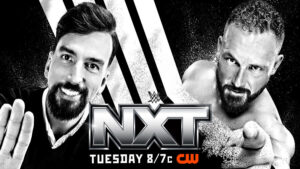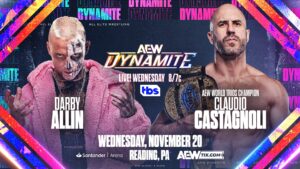When fans think about wrestlers who changed the industry, they’re likely to think about megastars like Hulk Hogan and “Stone Cold” Steve Austin, pioneering technical wrestlers like The Dynamite Kid and Ricky Steamboat, or perhaps female wrestlers like Gail Kim and Awesome Kong, who showed modern audiences that women could be a lot more than “Divas” who fought in bra-and-panties matches.
The name Fred Rosser III doesn’t usually come to mind. But it probably should, because in one brief moment, Rosser changed the wrestling industry forever.
Rosser, who’s best-known to WWE fans as Darren Young, has had something of a journeyman’s career in wrestling. He was part of the first season of NXT, back when it was a reality competition, alongside the likes of Daniel Bryan, Wade Barrett, and Skip Sheffield, aka Ryback. He later became part of the Nexus faction, and would also enjoy a brief Tag Team Championship run with Titus O’Neil as the Prime Time Players.
Not a bad career, but also not one you think of when you think of industry-changing performers. But that’s exactly what he did in 2013 with a brief, two-and-a-half-minute interview with TMZ, when he came out as gay.
During that interview, the reporter, who was likely just hanging around LAX airport in Los Angeles to see who he could talk to, approached Young and asked him if a gay person could ever be successful in wrestling or MMA.
“Absolutely,” Young said. “Look at me. I’m a WWE Superstar and…I’m gay.” Young seemed to catch the reporter off guard with the comment, but with that, Darren Young changed wrestling. Because while it might not seem like a big deal today, it made Young the first wrestler to publicly come out while under contract to a major American wrestling company.
At the time of Young’s coming out, there was barely any LGBTQ+ representation in mainstream wrestling. WWE had in the recent past featured angles like Billy and Chuck’s “gay wedding,” as well as the “lesbian stalker” angle between Mickie James and Trish Stratus. The same way LGBTQ+ characters were often treated as a joke or a source of derision in mainstream pop culture, so has the “gay” character often been used as a way to get heel heat on straight wrestlers, going back to the likes of “Exotic” Adrian Street in the UK, or Goldust, a character that started out by using his assumed sexuality to “intimidate” his straight opponents. In modern terms, both would be considered “queer coded villains”.
But LGBTQ+ wrestlers have always been part of the wrestling business, even if they weren’t “out.” In fact, LGBTQ wrestlers have had a tremendous influence on the industry, in the past and the present, and the impact these men and women have had on the business will surely be felt well into the future.
LGBTQ+ Wrestlers an Open Secret
One of the best examples is Pat Patterson. After being kicked out of his Montreal home in the 1950s by his parents after coming out to them, Patterson became a highly respected wrestler, both in tag teams and as a singles competitor, and worked for companies like the NWA, the AWA, and NJPW.
However, he’s best known for his WWF run, becoming the first Intercontinental Champion (while being managed by another closeted performer, “The Grand Wizard,” Ernie Roth) and later transitioning into a backstage role as a road agent and Vince McMahon’s right-hand man. One of his signature accomplishments was his creation of, and for many years the booking of, the Royal Rumble match, still one of WWE’s most popular annual events.
Patterson came out within the wrestling industry in the 1970s, and despite the occasional on-air joke by color commentators like Gorilla Monsoon and Jim Ross, it didn’t seem to adversely affect his career. He came out publicly in 2014, a year after Young did, on the WWE reality show Legends’ House.
There are of course many other LGBTQ+ performers who made waves, names like Sandy Parker and Babe Sharon deserve mentions. Although in the case of both Parker and Sharon they were open about their orientation as opposed to Patterson who was more reserved during his career.
Tragic Story
Although Patterson’s is mostly a positive story, there are also the tragic ones, such as that of Chris Kanyon. An innovative ring technician and good on the mic, Kanyon never seemed to break out of mid-card status in WCW (not that unusual, given how WCW booked talent at the time), and he also seemed to flounder in WWE. According to his posthumously-released book, Wrestling With Reality, Kanyon pitched WWE creative on the idea of wrestling as an openly gay wrestler, but his idea was turned down. Whether or not WWE realized that Kanyon was actually gay and had just come out to them is unclear.
After Kanyon was released from WWE in 2004, he accused the company of firing him for being gay. WWE denied the accusation, and he later retracted it. Kanyon bounced around the indies over the next few years and even retired a couple of times. He also struggled with bipolar disorder, which he wasn’t diagnosed with until he attempted suicide in 2003. Sadly, he succeeded in taking his life several years later, in 2010.
On his Talk Is Jericho podcast, Chris Jericho lamented that Kanyon felt like he couldn’t be himself, especially considering how, in his words, “nobody cares about that stuff today.” Kanyon will be remembered as a great wrestler, but whose struggles with his mental health and sexual identity ended his life far too young.
Rosser, too, says he was terrified that he had just made a career-ending mistake by coming out to TMZ. But according to him, he received a great deal of support from his WWE colleagues, including Randy Orton, The Big Show, Mark Henry, and Titus O’Neil. He said that Vince McMahon even called to commend him for his bravery in coming out.
Although Young was eventually released from WWE in 2017, he’s continued to work around the world for companies like CHIKARA, New Japan, and the NWA. Today, there are a number of LGBTQ+ performers in WWE, including Sonya Deville, Toni Storm, and Jake Atlas among others.

There are also a number of openly LGBTQ+ wrestlers flourishing outside of WWE: among them are Sonny Kiss, Anthony Bowens, and Nyla Rose in AEW, and ASUKA/Veny (not to be confused with WWE’s Asuka), a prolific genderless wrestler in Japan. The independent wrestling scene is also having its own LGBTQ+ revolution led by names like Effy and Edith Surreal.
Rosser has stated that he hopes to return to WWE, but whether or not Darren Young ever appears again, it’s still worth remembering that in one brief airport interview with TMZ, Fred Rosser III helped to break down the walls in mainstream professional wrestling.






